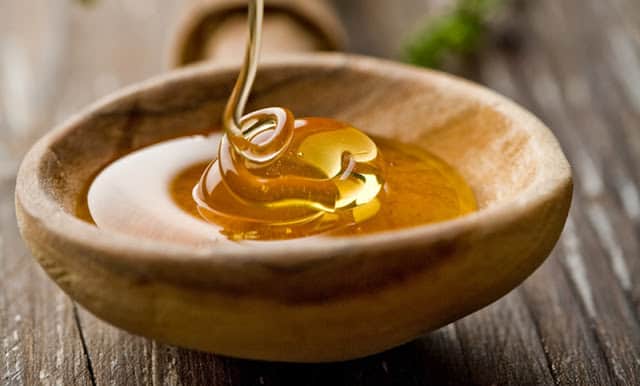Honey remedies have been used as a popular way to induce sleep for thousands of years.
An ancient Chinese saying calls for “eating honey every night,” and European folk healers have recommended drinking a cup of warm milk with a teaspoon of honey before bedtime since the Middle Ages.
Another old-fashioned honey and sleep remedy is to take two teaspoons of apple cider vinegar with two teaspoons of honey in a glass of warm water before bedtime, while traditional Mexican healers have long prescribed a teaspoon of raw honey in a cup of warm te de manzanilla, or chamomile tea. Variations that are said to induce sleep include a teaspoon of honey in a cup of hot water, a teaspoon of honey in a cup of passionflower tea, or simply a smear of honey on a peanut butter sandwich before bedtime.
Honey and Sleep (The HYMN Cycle)
Scottish pharmacist, researcher, and author Mike McInnis believes that honey remedies improve and lengthen restorative sleep by at least three mechanisms. When taken before bedtime, he teaches that honey: (1)
- Ensures adequate liver glycogen stores for eight hours of sleep (this prevents or limits the early morning release of two stress hormones, cortisol and adrenaline).
- Stabilizes blood sugar levels.
- Contributes to the release of melatonin, the hormone required for both the recovery and rebuilding of body tissues during rest.
The mechanism for this process can be described by what McInnes calls the honey-insulin-melatonin cycle or HYMN cycle. This cycle begins with the ingestion of one to two tablespoons of honey in the hour prior to bedtime, as follows:
1. The glucose moiety (portion) of honey passes from the gut, through the liver circulation and into the general circulation producing a mild glucose spike.
2. The mild elevation in blood sugar (from glucose) prompts a controlled release of insulin from the pancreas.
3. The presence of insulin in the general circulation drives tryptophan into the brain.
4. Tryptophan is converted to serotonin, a key hormone that promotes relaxation.
5. In darkness, serotonin is converted to melatonin in the pineal gland.
6. Melatonin activates sleep by reducing body temperature and other mechanisms. It also inhibits the release of more insulin from the pancreas, thus preventing a rapid drop in blood sugar level.
7. Melatonin promotes the release of growth hormone. Growth hormone is the hormone governing all of recovery physiology. This is the first step in recovery or restorative physiology that occurs overnight.
8. A cascade of recovery hormones initiates the repair, maintenance and rebuilding of bone, muscle and other body tissues.
9. Melatonin impacts memory consolidation by its requirement for the formation of neural cell adhesion molecules during REM sleep. These molecules are necessary for the processing of short-term memory from the hippocampus into long-term memory in the brain cortex.
10. Simultaneously, the fructose moiety of honey carries out its critical role. The liver takes up fructose and converts it to glucose, and then to liver glycogen, thus providing the brain with a sustained supply of glucose for the night fast.
11. Additionally, fructose regulates glucose uptake into the liver by prompting the release of glucokinase from the hepatocyte nuclei. Thus, fructose ensures good liver glycogen supply overnight and prevents a major glucose/insulin spike as referred to in step 1.
12. An adequate liver glycogen supply means that stress hormones need not be released.
The possibility that honey remedies can be used as a safe, inexpensive and effective sleep aid is exciting. Further research is needed in this important field with carefully controlled and randomized human trials.
Honey Remedies for Insomnia
Honey and sleep go hand in hand. Here are some additional recipes:
- Add 1 teaspoon of honey to one cup of warm chamomile, orange blossom, lemon balm or linden flower tea. Drink before bedtime.
- Add 2 teaspoon of honey to one cup of warm milk. Drink before bedtime.
- Prepare one-half glass of orange juice diluted with an equal amount of lukewarm water. Add 2 teaspoons of honey, and drink just before bedtime.
- Add 1 teaspoon of honey to a cup of warm peppermint tea. A clove can be added if desired.
- Combine 2 ounces of honey with 5 drops of lavender oil. Add 1 or 2 tablespoons of this mixture to a warm tub of water and enjoy a relaxing soak for 10 to 15 minutes


